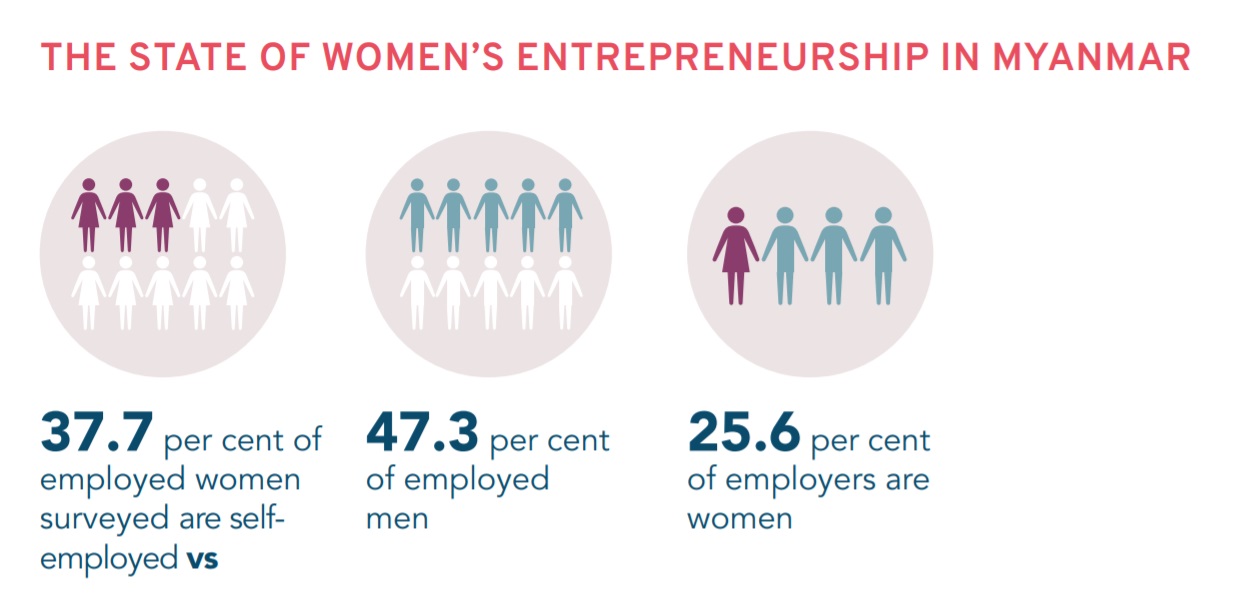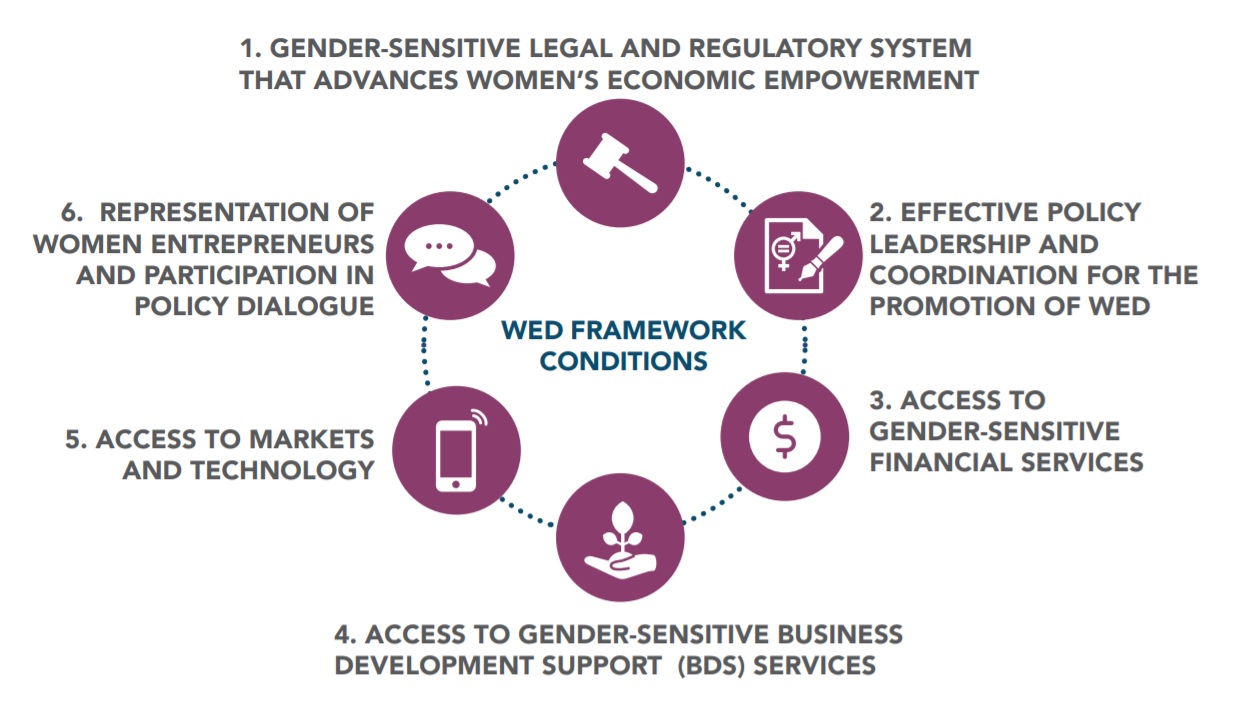Press Release
Improving women’s business participation, a key path to inclusive development in Myanmar
New report identifies Myanmar’s gender dividend through women’s entrepreneurship development
February 24, 2020
4 Min. Read
Myanmar has significant potential to benefit from a “gender dividend” by supporting women entrepreneurs and by promoting gender equality and non-discrimination in the workplace according to a new joint report issued by the International Labour Organization (ILO) and the Sasakawa Peace Foundation (SPF).
The report, titled National Assessment of Women's Entrepreneurship Development in Myanmar, found Myanmar’s female labour force participation rate to be far lower than men, at 47.7 per cent, compared to 77.3 per cent for men.
“Myanmar has significant untapped potential in terms of women’s innovation, productive capacities, and dynamism. Women’s entrepreneurship development is a key opportunity for Myanmar to generate jobs, new businesses, and diversify the economy,” says Mr. Donglin Li, ILO Liaison Officer in Myanmar.
According to the report, women in Myanmar account for an estimated 34 per cent of self-employed persons in the country but only 25.6 per cent of employers, suggesting that women face more challenges in growing micro-enterprises into small- and medium-sized enterprises and in creating jobs.
“Advancing gender equality and women’s economic empowerment through entrepreneurship is one of SPF’s primary goals. This research collaboration between ILO and SPF over the past year has increased our understanding of the situation for women entrepreneurs in Myanmar and provided insights into the critical conditions that are needed to help them grow their businesses, including access to markets, technologies, and business development services.” says Mr. Shuichi Ohno, President of SPF.
“However, the study also identified certain barriers that require attention and partnerships to overcome. We hope this national assessment will foster greater action and collaboration between important stakeholders from government, the private sector, civil societies, and entrepreneurship and business support organisations to create a better environment to allow more women-led and inclusive businesses in Myanmar to thrive.”
The report, titled National Assessment of Women's Entrepreneurship Development in Myanmar, found Myanmar’s female labour force participation rate to be far lower than men, at 47.7 per cent, compared to 77.3 per cent for men.
“Myanmar has significant untapped potential in terms of women’s innovation, productive capacities, and dynamism. Women’s entrepreneurship development is a key opportunity for Myanmar to generate jobs, new businesses, and diversify the economy,” says Mr. Donglin Li, ILO Liaison Officer in Myanmar.
According to the report, women in Myanmar account for an estimated 34 per cent of self-employed persons in the country but only 25.6 per cent of employers, suggesting that women face more challenges in growing micro-enterprises into small- and medium-sized enterprises and in creating jobs.
“Advancing gender equality and women’s economic empowerment through entrepreneurship is one of SPF’s primary goals. This research collaboration between ILO and SPF over the past year has increased our understanding of the situation for women entrepreneurs in Myanmar and provided insights into the critical conditions that are needed to help them grow their businesses, including access to markets, technologies, and business development services.” says Mr. Shuichi Ohno, President of SPF.
“However, the study also identified certain barriers that require attention and partnerships to overcome. We hope this national assessment will foster greater action and collaboration between important stakeholders from government, the private sector, civil societies, and entrepreneurship and business support organisations to create a better environment to allow more women-led and inclusive businesses in Myanmar to thrive.”

Supporting more women entrepreneurs to succeed in business
The report identifies key enabling factors to help women entrepreneurs in Myanmar using ILO’s dedicated WED National Assessment methodology. Within this methodology, the voice of women entrepreneurs is key.
Of the six areas reviewed in the WED assessment, a “gender-sensitive legal and regulatory system that advances women’s economic empowerment” was found to be the strongest, largely due to Myanmar’s labour laws, which promote gender equality. The weakest area was found to be national policy leadership and coordination for the promotion of women’s entrepreneurship. The assessment found many initiatives however there is no national or inter-governmental strategic framework that includes support measures directed towards women-owned enterprises. The report provides a list of recommendations that stakeholders can avail for a coordinated strategy to develop women’s entrepreneurship at the national level.
According to the survey, the top two motivations for women to go into business were to be their own boss and to manage their work and family responsibilities. At the same time, one of the top constraints to women entrepreneurs is access to finance due to a lack of collateral and financial products that cater to their needs. Other barriers include cultural gender norms and attitudes towards the role of women in society, a disproportionate share of unpaid domestic and care work that leaves them with less time for their business, and the under-valuing of women as business leaders. These challenges result in increased difficulties for women in starting and growing their businesses.
The report identifies key enabling factors to help women entrepreneurs in Myanmar using ILO’s dedicated WED National Assessment methodology. Within this methodology, the voice of women entrepreneurs is key.
Of the six areas reviewed in the WED assessment, a “gender-sensitive legal and regulatory system that advances women’s economic empowerment” was found to be the strongest, largely due to Myanmar’s labour laws, which promote gender equality. The weakest area was found to be national policy leadership and coordination for the promotion of women’s entrepreneurship. The assessment found many initiatives however there is no national or inter-governmental strategic framework that includes support measures directed towards women-owned enterprises. The report provides a list of recommendations that stakeholders can avail for a coordinated strategy to develop women’s entrepreneurship at the national level.
According to the survey, the top two motivations for women to go into business were to be their own boss and to manage their work and family responsibilities. At the same time, one of the top constraints to women entrepreneurs is access to finance due to a lack of collateral and financial products that cater to their needs. Other barriers include cultural gender norms and attitudes towards the role of women in society, a disproportionate share of unpaid domestic and care work that leaves them with less time for their business, and the under-valuing of women as business leaders. These challenges result in increased difficulties for women in starting and growing their businesses.

This research was conducted based on an MOU between the ILO and SPF that seeks to promote gender equality and women’s entrepreneurship in Myanmar. As the first National WED Assessment to be conducted in Myanmar, the report incorporates insights from key informants including government ministries, NGOs, women’s organizations, women entrepreneurs’ associations, banks, microfinance institutions, business and employer membership organizations, and business support and training providers.
The ILO’s WED programme has been in operation since 2002, and works with local policy and implementing organizations to increase economic opportunities for women entrepreneurs by supporting them in starting, strengthening, and expanding their enterprises.
The full report (English) and Executive Summary (Burmese and English) can be found here.
The ILO’s WED programme has been in operation since 2002, and works with local policy and implementing organizations to increase economic opportunities for women entrepreneurs by supporting them in starting, strengthening, and expanding their enterprises.
The full report (English) and Executive Summary (Burmese and English) can be found here.
Please direct all inquiries to:
Joni Simpson, Senior Specialist Gender, Equality and Non-Discrimination, ILO, Email: simpson@ilo.org
Media Relations Division, Sasakawa Peace Foundation, Email: spfpr@spf.or.jp
Joni Simpson, Senior Specialist Gender, Equality and Non-Discrimination, ILO, Email: simpson@ilo.org
Media Relations Division, Sasakawa Peace Foundation, Email: spfpr@spf.or.jp